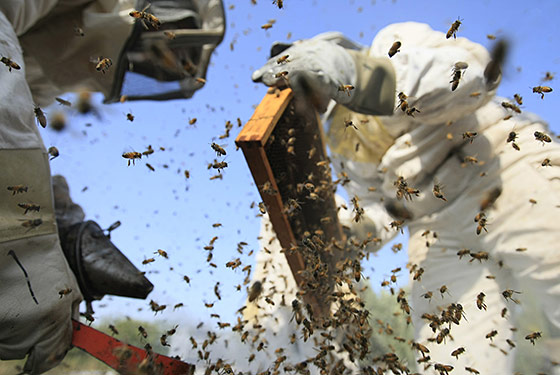 New observations this year about snow, ice and temperatures support the conclusion that the Arctic is unlikely to return to the conditions known in the 20th century — and that's likely to affect the weather in the lower 48 United States.
New observations this year about snow, ice and temperatures support the conclusion that the Arctic is unlikely to return to the conditions known in the 20th century — and that's likely to affect the weather in the lower 48 United States.
That was this year's key message in the annual update of the National Oceanic and Atmospheric Administration's Arctic report card, released Thursday. The key points, a video and links to scientific reports by 69 scientists from eight countries are available from NOAA online.
NOAA: Warming Arctic unlikely to return to how it was
Why is the world rushing headlong into Environmental Armageddon?
 Is there any doubt that planet Earth has been undergoing an environmental armageddon for decades? We are not just referring to the spate of oil spills all over the world such as the BP Gulf Oil Spill, or the many other toxic deluges which go unreported unlike the Hungary Toxic Sludge Disaster, or the ongoing destruction of the world’s rainforests like those being systematically wiped out in the Amazon Basin. We are also alluding to the “unseen” worldwide chemical apocalypse, the global proliferation of electro-pollution (EMR), the major uptick in man-made geopathic stress events on both the micro and macro levels, as well as the relentless contamination of living environments throughout the planet with radioactivity.
Is there any doubt that planet Earth has been undergoing an environmental armageddon for decades? We are not just referring to the spate of oil spills all over the world such as the BP Gulf Oil Spill, or the many other toxic deluges which go unreported unlike the Hungary Toxic Sludge Disaster, or the ongoing destruction of the world’s rainforests like those being systematically wiped out in the Amazon Basin. We are also alluding to the “unseen” worldwide chemical apocalypse, the global proliferation of electro-pollution (EMR), the major uptick in man-made geopathic stress events on both the micro and macro levels, as well as the relentless contamination of living environments throughout the planet with radioactivity.
EPA faulted for not disclosing coal ash's recycling risks
 The Environmental Protection Agency's inspector general reported this week that the EPA had improperly used an official website to promote ways of recycling the waste that's left over when power plants burn coal, commonly known as coal ash.
The Environmental Protection Agency's inspector general reported this week that the EPA had improperly used an official website to promote ways of recycling the waste that's left over when power plants burn coal, commonly known as coal ash.
The inspector general's report says the website didn't tell the public that the EPA had decided that coal ash no longer should be dumped in empty pits and that it had concerns about the safety of other uses of the material in loose form, such as fertilizer and road fill.
Brazil eyes microchips in trees for forest management
 A chainsaw buzzes, branches snap, and an Amazon tree crashes to the ground. It could be just another of the thousands of trees felled each year in Brazil's portion of the world's largest forest except for one detail: a microchip attached to its base holding data about its location, size and who cut it down.
A chainsaw buzzes, branches snap, and an Amazon tree crashes to the ground. It could be just another of the thousands of trees felled each year in Brazil's portion of the world's largest forest except for one detail: a microchip attached to its base holding data about its location, size and who cut it down.With a hand-held device, forestry engineer Paulo Borges pulls up the tree's vital statistics from the chip -- a 14-meter-high (46-foot) tree known as a "mandiocao" cut down in Mato Grosso state, the southern edge of the Amazon where the forest has largely been cleared to create farmland.
Bee Mystery Unsolved? Lead Investigator Had Connections to Pesticide Maker
 Yesterday's New York Times featured a heartwarming ending to the years-long murder mystery of what was causing Colony Collapse Disorder (CCD) among honeybees. Experts suspected pesticides or genetically modified foods, but the article reported that the University of Montana's Bee Alert Team, working alongside the Army, found the cause: the combined effects of a virus and fungus. Data sharing! Chance discoveries! Honeybees live on to sting another day! But according to Fortune, there were a couple of details left out of the front-page story. The team's lead investigator, Dr. Jerry Bromenshenk, may have previously dropped out of testifying in a class-action lawsuit after he received a significant research grant from the pharmaceutical giant Bayer. For years, beekeepers have tried to pursue legal action against Bayer Crop Science over their pesticides, in particular a type of neurotoxin that gets rids of insects by attacking their nervous systems. The beekeepers allege that the pesticides disoriented and killed their hives. One of the markers of CCD is a bee's tendency to fly off in a random direction before it dies.
Yesterday's New York Times featured a heartwarming ending to the years-long murder mystery of what was causing Colony Collapse Disorder (CCD) among honeybees. Experts suspected pesticides or genetically modified foods, but the article reported that the University of Montana's Bee Alert Team, working alongside the Army, found the cause: the combined effects of a virus and fungus. Data sharing! Chance discoveries! Honeybees live on to sting another day! But according to Fortune, there were a couple of details left out of the front-page story. The team's lead investigator, Dr. Jerry Bromenshenk, may have previously dropped out of testifying in a class-action lawsuit after he received a significant research grant from the pharmaceutical giant Bayer. For years, beekeepers have tried to pursue legal action against Bayer Crop Science over their pesticides, in particular a type of neurotoxin that gets rids of insects by attacking their nervous systems. The beekeepers allege that the pesticides disoriented and killed their hives. One of the markers of CCD is a bee's tendency to fly off in a random direction before it dies.
Toxic coal sludge pollutes Ky. town 10 years later
 In parts of eastern Kentucky, the pictures coming out of Hungary of the red sludge that roared from a factory's reservoir, downstream into the Danube River, are all too reminiscent of what happened a decade ago this week.
In parts of eastern Kentucky, the pictures coming out of Hungary of the red sludge that roared from a factory's reservoir, downstream into the Danube River, are all too reminiscent of what happened a decade ago this week.
A layer of dark goo still sits under a creekbed on Glenn Cornette's land, the leftovers from when a coal company's sprawling slurry pond burst, blackening 100 miles of waterways and polluting the water supply of more than a dozen communities before the stuff reached the Ohio River.
$5 trillion: The cost each year of vanishing rainforest
 British scientific experts have made a major breakthrough in the fight to save the natural world from destruction, leading to an international effort to safeguard a global system worth at least $5 trillion a year to mankind.
British scientific experts have made a major breakthrough in the fight to save the natural world from destruction, leading to an international effort to safeguard a global system worth at least $5 trillion a year to mankind.
Groundbreaking new research by a former banker, Pavan Sukhdev, to place a price tag on the worldwide network of environmental assets has triggered an international race to halt the destruction of rainforests, wetlands and coral reefs.
The Big Secret Commercial Water Companies Hope You Never Discover…
 Bottled water has been falling out of public favor for years now, once people began to realize just how detrimental all those plastic bottles are to the environment – and what a rip-off bottled water often is in terms of price and purity.
Bottled water has been falling out of public favor for years now, once people began to realize just how detrimental all those plastic bottles are to the environment – and what a rip-off bottled water often is in terms of price and purity.
Now, instead of toting a plastic bottle of water everywhere, the “in” thing is to carry a refillable bottle of filtered tap water -- it’s better for you and the environment.
Offshore ban stays as U.S. issues new drilling rules
 Interior Secretary Ken Salazar on Thursday unveiled new regulations aimed at reshaping the nation's offshore drilling industry in the wake of the BP oil spill.
Interior Secretary Ken Salazar on Thursday unveiled new regulations aimed at reshaping the nation's offshore drilling industry in the wake of the BP oil spill.
"These new rules and the aggressive reform agenda we have undertaken are raising the bar for the oil and gas industry's safety and environmental practices on the Outer Continental Shelf," Salazar said.
He also defended his department's deepwater drilling ban. Salazar said he would lift the ban when he is "comfortable" that risks associated with drilling have been significantly reduced.
More Articles...
Page 120 of 157

 Environmental News Archive
Environmental News Archive


































